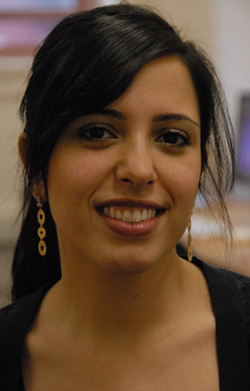Game On!
Azadeh Jamalian believes in the power of play
By Zoe Singer
While many parents and educators try to tear children from their TVs, computers and phones, Azadeh Jamalian takes a different perspective on the plugged-in kid. In her Master’s thesis in Instructional Technology and Media, she posits that the right game, digital or non-, could give preschoolers “a long-term mathematical advantage in school and in life.”
Now a first-year Ph.d student in TC’s Cognitive Studies in Education program, Jamalian (Azi to her friends) is working on realizing that potential. Last spring, she received a certificate of innovation from the Cooney Center at Sesame Workshop for her Master’s project, a smart phone game for preschoolers called Boogie Bash that she designed with TC doctoral candidate Jessica Hammer.
Boogie Bash is an educational, age-appropriate “leisure” activity for preschoolers. To play, kids respond to audio tones with physical gestures in order to build patterned towers of colored blocks. The aim is to help young children abstract the mathematical concepts of pattern recognition through a multi-modal approach. To the layperson, Boogie Bash resembles a simplified, gestural version of Tetris (the computer puzzle game developed in the 1980s), or perhaps—for those graybeards who recall the really early days of electronic gaming—an onscreen “Simon Says.”
While she played her share of Atari as a child in Iran, Jamalian never imagined that gaming would be an integral part of her adult life. She immigrated to Vancouver at 16, where she finished high school and went on to earn a B.S. in Systems Engineering at Simon Fraser University. As an undergrad, Jamalian began tutoring and became interested in education. She took a job at an inclusive Vancouver educational company called BrainBoost, which focused on math and science.
At BrainBoost, Jamalian developed projects using simple robotics, magnets and even the energy in fruit. But motivated by a desire to reach a broader clientele, including some of her own students, who had disabilities, she began searching online for educational computer games. “I realized I could actually engage them more while they were in front of a screen,” she recalls. Well-designed games were scarce though, and in 2008 she decided to pursue the subject at TC.
Jamalian’s realization—that games can create learning opportunities difficult to evoke in other media—is at the heart of her graduate work. “I don’t look at games just as something to motivate kids,” she says, “I think they’re also useful in terms of crafting a certain experience that will help people think and learn.”
As a primary designer and researcher on a smoking reduction mobile game project called LIT, Jamalian takes the same approach to adult behavior change. The game, which players control by breathing into a microphone, is designed to mimic the emotional and physiological effects of smoking. The LIT project, which is overseen by TC's Charles Kinzer, Professor of Education, received a $150,000 grant from the Robert Wood Johnson Foundation this past summer.
In addition to her ongoing work on LIT, Jamalian is developing learning activities based on game principles, with the goal of creating resources for both educators and game designers. She is also a research fellow on the MathemAntics project led by Herbert Ginsburg, TC’s Jacob H. Schiff Foundations Professor of Psychology and Education, studying schoolchildren to inform the design of a sequence of math computer games. Finally, working with Barbara Tversky, Professor of Psychology and Education, she’s pursuing cognitive research in spatial thinking and gesturing—a field she drew on in designing Boogie Bash. “What I’m trying to bring together from all these projects is spatial thinking, embodied learning and math education. And I think I can use games to bring these together.” It’s a lot, she admits, “but it will make sense.” She laughs. ”Eventually.”
Published Monday, Feb. 7, 2011
